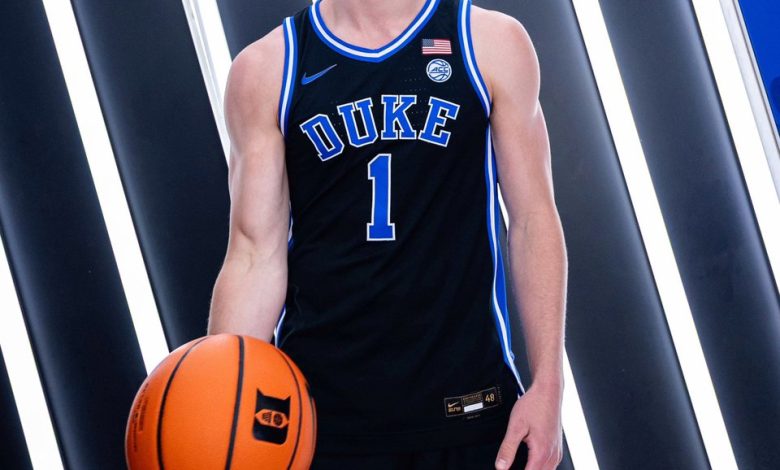Strategic Depth: Princeton Transfer Jack Scott Signs with Duke, Strengthening the Blue Devils’ Backcourt for Their Upcoming Pursuit.

Strategic Depth: Princeton Transfer Jack Scott Signs with Duke, Strengthening the Blue Devils’ Backcourt for Their Upcoming Pursuit.
In a move that has sent ripples through college basketball circles, Princeton transfer Jack Scott has officially committed to Duke University, promising to significantly bolster the Blue Devils’ backcourt as they prepare for their next competitive run. This strategic addition underscores Duke’s commitment to maintaining their status as a powerhouse in NCAA basketball by acquiring a talented, versatile player who can contribute immediately and provide depth for future seasons. Scott’s transfer not only enhances the team’s roster but also reflects a broader trend of top programs seeking experienced players from renowned programs to elevate their competitiveness. This comprehensive analysis explores Jack Scott’s background, his playing style, the strategic importance of his transfer to Duke, and how he fits into the Blue Devils’ broader basketball philosophy and future plans.
**Background and Development of Jack Scott**
Jack Scott emerged as a notable talent during his tenure at Princeton University, a program renowned for its disciplined approach and academic excellence. Standing approximately 6’8” and possessing a versatile skill set, Scott played a pivotal role in Princeton’s recent successes, contributing both offensively and defensively. His development as a player has been marked by steady improvement, with a particular emphasis on his ability to stretch the floor, handle the ball, and defend multiple positions. Coming from a rigorous academic environment, Scott’s intelligence and work ethic translate well onto the basketball court, making him an appealing prospect for programs like Duke seeking not just talent but also high-character individuals who can adapt quickly to high-pressure situations.
During his time at Princeton, Scott distinguished himself as a reliable scorer and a tenacious defender. His shooting ability, especially from beyond the arc, demonstrated significant growth, allowing him to space the floor effectively. Additionally, his rebounding and defensive versatility provided Princeton with a flexible option that could be plugged into various lineups. His leadership qualities and experience in a disciplined system further underscore his readiness to contribute at a higher level of competition, such as the Atlantic Coast Conference (ACC), where Duke competes.
**The Transfer: A Strategic Move by Duke**
Duke’s decision to bring Jack Scott into their program aligns with a broader strategic trend among top-tier college basketball programs. As the transfer portal continues to reshape the landscape of NCAA athletics, programs are increasingly seeking experienced players who can make immediate impacts. Scott’s transfer is particularly significant because it signals Duke’s intent to reinforce their backcourt and frontcourt depth, especially after key departures and the inevitable turnover that comes with graduation and early NBA entries.
Duke’s coaching staff, led by head coach Jon Scheyer, has meticulously evaluated transfer targets to find players who fit both the system and the culture. Scott’s skill set complements Duke’s strategic approach, which emphasizes ball movement, perimeter shooting, and versatile defense. His ability to handle the ball and create plays from the wing or even as a secondary ball-handler allows Duke to diversify their offensive options. Moreover, Scott’s defensive versatility enables him to guard multiple positions, aligning with Scheyer’s emphasis on switching and high-pressure defense.
This transfer also signals Duke’s commitment to building a team capable of competing at a national level, not just in the ACC. With the landscape evolving and other programs making similar moves, Duke’s acquisition of Scott positions them to contend for postseason success, including deep runs in the NCAA Tournament. The added depth and experience will be invaluable, especially as the team integrates new pieces and develops chemistry.
**Playing Style and Fit within Duke’s System**
Jack Scott’s playing style is characterized by his ability to stretch defenses with his outside shooting, his rebounding prowess, and his defensive versatility. His shooting percentages from three-point range and his ability to make smart plays off the dribble make him a modern wing player who can create spacing and scoring opportunities. His rebounding ability allows him to contribute on the glass, providing second-chance opportunities on offense and limiting opponents’ second chances on defense.
Within Duke’s system, which emphasizes fast-paced ball movement, perimeter shooting, and aggressive defense, Scott’s skill set is a perfect fit. His experience at Princeton, where disciplined half-court sets and smart decision-making are emphasized, will translate well into Duke’s more dynamic style. Additionally, his versatility means he can play multiple roles—whether as a secondary scorer, a facilitator, or a defensive stopper—depending on the game situation.
Furthermore, Scott’s basketball IQ and experience playing in high-pressure situations will help him adapt quickly to the demands of the ACC and NCAA Tournament play. Duke’s coaching staff is known for developing players’ skills and strategic understanding, and Scott’s background suggests he has the maturity and work ethic necessary to thrive in this environment.
**Impact on Duke’s Roster and Future Prospects**
The addition of Jack Scott has several implications for Duke’s roster management and future success. Firstly, it provides immediate depth, allowing Scheyer to deploy versatile lineups that can adapt to different opponents and game situations. This depth is crucial during the grueling conference schedule and postseason play, where injuries and fatigue can influence outcomes.
Secondly, Scott’s experience and skill set fill specific needs for Duke, particularly in the wing position. His ability to shoot from long range will help space the floor, opening driving lanes for star guards and facilitating more effective ball movement. His rebounding and defensive versatility add to the team’s toughness and resilience, making Duke a more well-rounded unit.
Thirdly, Scott’s presence signals a strategic focus on recruiting and developing players who can contribute immediately. As Duke aims to reclaim its place at the top of college basketball, integrating experienced transfers like Scott is a key part of their approach. This move also demonstrates a commitment to blending young talent with seasoned players to create a balanced, competitive roster.
Looking ahead, Scott’s role will be vital in Duke’s ambitions for NCAA Tournament success. His experience at Princeton, coupled with the coaching staff’s development programs, positions him as a potential key contributor in high-stakes games. If he adapts quickly and integrates seamlessly into the team’s offensive and defensive schemes, he could emerge as a leader on and off the court.
**Broader Implications in College Basketball**
The transfer of Jack Scott from Princeton to Duke exemplifies broader trends in college basketball, where the transfer portal has become a vital tool for programs seeking to enhance their rosters rapidly. Top programs are increasingly prioritizing experienced players who can contribute immediately, often from successful mid-major programs or other Power Five conferences. This movement underscores the shifting landscape of NCAA basketball, where player mobility, NIL opportunities, and coaching changes have created a dynamic environment.
Scott’s transfer also highlights the importance of strategic recruitment and the value of a player’s fit within a specific system. Duke’s emphasis on versatile, high-IQ players aligns with Scott’s profile, demonstrating how programs are meticulously scouting and targeting players who can fill specific needs.
Furthermore, this transfer reflects a broader recognition of the importance of depth and experience in achieving postseason success. As the competition intensifies and the stakes rise, having reliable, experienced players can make the difference between an early exit and a deep tournament run.
**Conclusion**
The signing of Princeton transfer Jack Scott marks a significant milestone in Duke’s ongoing quest to maintain basketball excellence. His arrival not only strengthens the Blue Devils’ backcourt but also embodies a strategic effort to blend youth with experience, versatility with discipline. Scott’s development at Princeton, coupled with Duke’s coaching expertise and competitive environment, positions him as a key piece in the team’s pursuit of another successful season. As college basketball continues to evolve, the transfer portal remains a powerful tool, and Scott’s move to Duke exemplifies how top programs leverage it to build resilient, adaptable, and championship-ready rosters. With his skills, basketball IQ, and character, Jack Scott has the potential to be a transformative presence at Duke, helping propel the Blue Devils toward their next pursuit of NCAA glory.









